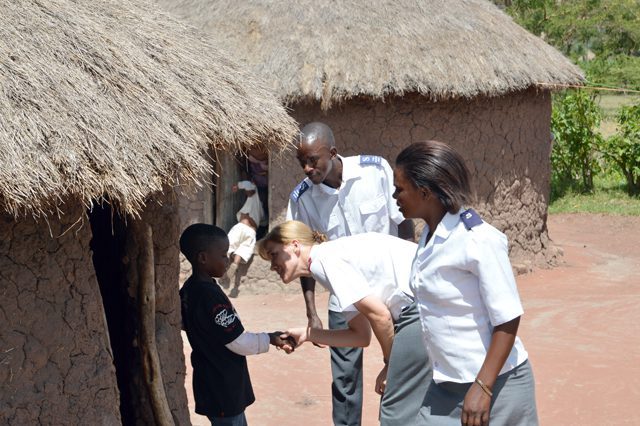The Salvation Army holds second International Theology and Ethics Symposium; first was held in 2001 in Canada.
Captain Ivan Wild spends time with some of the local children in Soweto, South Africa. |
This summer, 57 participants from 37 Salvation Army territories/commands met just outside Johannesburg, South Africa, for the Army’s second International Theology and Ethics Symposium, “People of God—Salvationist Ecclesiology.” Delegates looked at what it means to be disciples of Christ and how Salvationists can be servant-members of his church through The Salvation Army. General Shaw Clifton and Commissioner Helen Clifton took part in the symposium.
Attending from the Western Territory were Major Donna Ames, Salem, Ore. corps officer, and Captain Ivan Wild, Torrance, Calif. corps officer.
The keynote address was delivered by Dr Robert Lang’at, an African Wesleyan theologian who has served as Head of the Department of Education and Theology at Kabarak University in Kenya where he now holds the position of Provost. His address, “The Salvation Army as a Christian church with a Social Conscience,” concluded by indicating that The Salvation Army has established a viable self-understanding as a church that balances its “church institution” form with its “missionary band” existence. Its church foundation in the Wesleyan/holiness movement, he suggested, has provided it with a theological rationale for its social agenda.
Doctor Lang’at affirmed that The Salvation Army was ahead of its time in its approach to African social issues but he suggested that the Army needs to re-engage and clarify its place within the universal Christian Church. What it means to be a Salvation Army church in the African context still needs clarification, he said, explaining that its social programs need to be redemptive and to be continually informed by theological roots and theological reflection, particularly in the third world.
The theme, “Salvationist Ecclesiology,” was developed throughout the week. Delegates presented and discussed papers on Salvation Army church identity, Salvation Army church mission, ministry and leadership, and Salvation Army church worship.
Captain Wild commented: “I was blessed by meeting officers and soldiers from around the world who share a passion for theology in The Salvation Army context. I did not always find myself in complete agreement and often engaged in debate throughout the week. I became more sensitive to various cultures within the Army world.”
On the welcome night, the General was optimistic that the outcomes of the symposium would benefit Salvationists everywhere. To that end, on the symposium’s final day, participants met in small groups to define affirmations and visions, resulting in recommendations for the Doctrine Council to submit to the General for possible implementation for the good of the Army as a whole and the kingdom of God.
In his concluding remarks in his paper on Sunday evening, the General spoke to the theme of the symposium, stating: “What kind of church are we called under God to be? This is the ecclesiological question for our times. The answers for our generation will appear as part of a constantly creative continuum coming from the mind of God, who does not conduct his dealings with his people in an arbitrary fashion. By this we know that God will build creatively upon the traditions he has given us.”
The General and Commissioner Clifton provided a special Sunday morning worship service, supported by Southern Africa territorial leaders Commissioners Trevor (territorial commander) and Memory Tuck and Lt. Colonels Hezekiel (chief secretary) and Mirriam Mavundla, among others.
In closing, the General expressed his hope for the symposium: “That its fruits can eventually become evident and that the wider Army will have cause to be grateful.”From a report by Colonel Earl Robinson
(chair of the International Doctrine Council)











